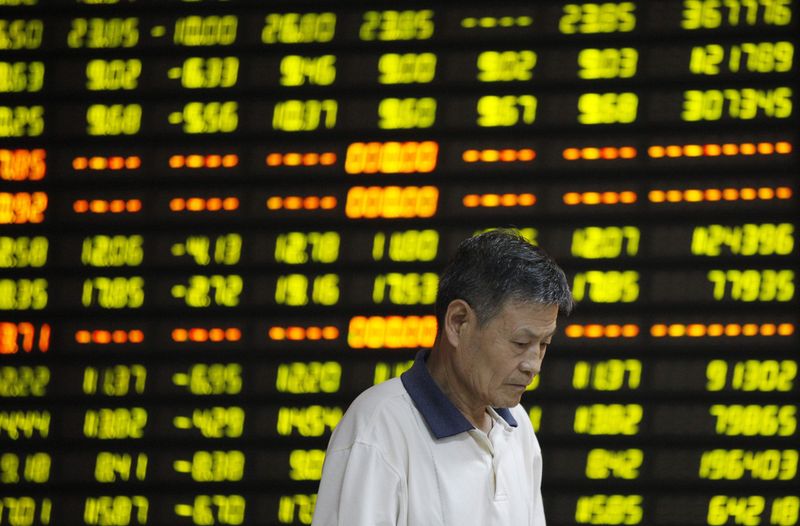By Samuel Shen and Pete Sweeney
SHANGHAI (Reuters) - Chinese shares fell on Tuesday, as Beijing scrambled once again to prop up a stock market whose wild gyrations have heightened fears about the financial stability of the world's second biggest economy.
After a plunge of more than 8 percent in major indexes on Monday, Chinese regulators said they were prepared to buy shares to stabilise the stock market, while the central bank injected cash into money markets and hinted at further monetary easing.
But despite those moves, aimed at bolstering the confidence of the ordinary investors who dominate China's equity markets, the CSI300 index (CSI300) of the largest listed companies in Shanghai and Shenzhen fell 0.2 on Tuesday, while the Shanghai Composite Index (SSEC) shed 1.7 percent.
A highly volatile day - not unusual in China's unruly stock markets - had seen both indexes lurching between losses as deep as 5 percent and gains of more than 1 percent.
"Retail investors' confidence in the mainland market is very weak," said Steven Leung, a director from UOB Kay Hian in Hong Kong.
Monday's dramatic slide shattered three weeks of relative calm for Chinese equities, secured through heavy government intervention in which authorities pumped liquidity into the market while effectively barring many investors from selling.
The rapid sell-off, which saw China's major indexes suffer their biggest one-day loss in more than eight years, may have been partly due to authorities testing the water for withdrawing some of that heavy-handed support.
Three people in the banking industry with direct knowledge told Reuters on Monday that the state-run margin lender had returned ahead of schedule some of the funds it borrowed from commercial banks to stabilise the stock market.
"The authorities picked an inopportune time to float a trial balloon about scaling back market support operations," wrote Tim Condon, head of research Asia for ING Bank in Singapore, in a note on Tuesday.
"Lesson learned: sentiment manifestly remains fragile."
WILD VOLATILITY
The wild volatility in China's markets has stoked fears among global investors about the broader health of the Chinese economy, and sent Asian investors scurrying on Tuesday for safe-haven assets such as government bonds and the Japanese yen. [MKTS/GLOB]
The renewed turbulence also raised questions about the long-term viability of Beijing's strategy of intervening to control its markets.
"The government's intervention in the market may work in the short-term, but will nonetheless create longer-term issues," said Bernard Aw, market strategist at IG in Singapore. "So in that sense, a government bent on control most of the time and free markets simply cannot meet each other halfway."
But, while recent stock market weakness will have caught out many Chinese retail investors and companies, the relatively low rate of stock ownership by households and a disconnect between valuations and economic fundamentals mean the impact on the economy is likely to be less than it would be in other markets.
China's top economic planner described the stock market turbulence as "abnormal", but said it was optimistic on the outlook for the economy in the second half of the year.
"The fundamentals of China's economy are stabilising and turning better," Li Pumin, secretary general of the National Development and Reform Commission, told a briefing in Beijing.
"So we have the foundation and necessary means to keep the healthy development of capital market including the stock market."
MONETARY FIREPOWER
The People's Bank of China said on Tuesday it would inject 50 billion yuan ($8.05 billion) into money markets in its biggest liquidity boost since July 7, near the trough of the last market sell-off.
The central bank also said, in a statement before the stock market opened, that it would use "various monetary tools" to maintain "appropriate levels of liquidity", a signal that the further monetary easing that many analysts have predicted could be in store.
Despite a slowing economy, China's main stock indexes had more than doubled over the year to mid-June, when a sudden swoon saw shares lose more than 30 percent of their value in a matter of weeks.
Markets finally began stabilising in the second week of July after a barrage of official support measures that were rewarded with a rebound of more than 15 percent, prior to Monday's slide.
China's central bank cut interest rates, brokerages formed stabilisation funds and regulators lifted restrictions on pensions and insurers investing in stocks.
Beijing also cracked down on "malicious" short-sellers in the futures market, froze IPOs to prevent a liquidity drain and looked the other way as around 40 percent of companies suspended trading in their shares to escape the rout.
In the latest in a series of supportive commentaries from state-owned media, the Shanghai Securities News said in a front page editorial on Tuesday that investors should view the latest sell-off "logically" and that China's economic fundamentals were still sound.

"The stable development trend of the A-share (domestic)market will not be altered by a single day plunge," it said.